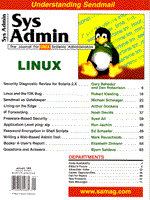
New Messages
Please send letters via email to saletter@mfi.com. I downloaded the syslog monitoring script from your site and gave it a go. It was nice, but I wanted to colorize key words and not the entire line. I hacked the script to do this, but found that it was highly processor-intensive. I wrote a new script, enclosed below, that not only is faster but allows colorization of PERL regular expressions. I run it on a Linux box. I have symlinks of all my logs in /root/LOGS/.
#!/usr/local/bin/perl
## by phil macias
## 10/7/98
%hash = (
## system
"su " => "[41;31;1m",
"kernel" => "[41;31;1m",
## DNS
"named" => "[44;36;1m",
"Err/TO" => "[44;36;1m",
## sendmail
"sendmail" => "[40;36;1m",
"stat=Deferred" => "[40;36;1m",
"dead.letter" => "[40;36;1m",
"return to sender" => "[40;36;1m",
## web
"GET" => "[40;32;1m",
## ip addresses
'\d+\.\d+\.\d+\.\d+' => "[40;33;1m",
);
open(LOGGER, "tail -v -n1 -f /root/LOGS/* |");
while(<LOGGER>)
{
foreach $h (keys %hash)
{
if (/$h/i)
{
s/($h)/\033$hash{$h}$1\033[0m/;
}
}
print;
}
Thanks for sharing your script.
From: David Covey Please rescue me from the depths of ignorance. Alan Stone's letter in the September issue claims that FreeBSD is "UNIX" (or "Unix", in the subject) and Linux is UNIX-like. Both he and Ralph the editor discount the legal aspects of the name. To my knowledge, the legal aspect is the only one that ever mattered. I once was taught that AT&T released UNIX (TM) on the world. The folks at Berkeley added some good ideas to the AT&T OS, giving rise to Unix (note the case, not a trademark). ULTRIX, HP-UX, SunOS, FreeBSD, and yes, even Linux are versions of Unix inasmuch as the name means anything at all. UNIX (TM) refers to the one and only trademarked product now owned by X/Open, if I heard the news right. Alan's subject line is correct but the body of his letter only confuses the issue, and Ralph didn't clear things up either. What distinction is being made here? The BSD group worked hard to show that they were not UNIX (TM), and so not violating the trademark owned by AT&T. That was a big step in making FreeBSD possible. Linux does not have this direct BSD lineage but was born of similar motivation for freely available source code. I don't like these semantic games; in this case it is in fact the lawyers' domain. Let's leave it to them, for good. David Covey
Sorry to disappoint, but UNIX is a registered trademark, and thus deserves an (r) not a (TM). Further, the AT&T lawyers also considered Unix to be covered by the registration, and thus subject to licensing and use restrictions. That is why early vendors used various IX-appended product names rather than UNIX or Unix. Users, on the other hand, tend to ignore the legal distinctions and use the term to refer to all implementations. Through X/Open certification and licensing, operating systems, such as OS/390, that are not derived from either UNIX System V or BSD can be called UNIX. Editorially, the general usage works nicely for all but legal discussions. The alternative is to select an Egyptian-looking symbol, the name of which cannot be pronounced, and refer to it as the operating system formerly known as U*ix.
Thanks for writing,
|